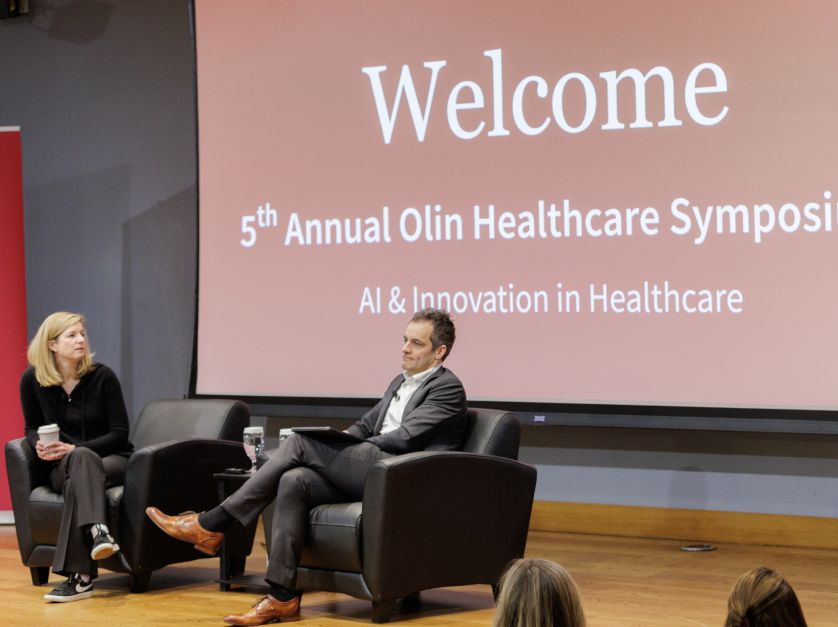5th annual healthcare symposium explores AI’s challenges and opportunities
- January 29, 2024
- By Kurt Greenbaum
- 3 minute read

When the keynote speaker’s oldest son was born in a Boston hospital, he had a rare heart condition.
And the only reason they picked it up, she explained, was that their pediatric cardiologist happened to be from the city’s Children’s Hospital.
They happened to have seen 50 cases of this condition. Which means if he'd been born in a rural hospital in Montana, they never would have picked it up.
Sarah London, CEO of Centene
But suppose artificial intelligence could have been a copilot in the process? Perhaps those Montana doctors would have tools to pick up on a heart condition they’d never personally seen.
London shared the brief anecdote at WashU Olin’s fifth annual healthcare symposium on January 25, 2024, which centered on the theme of AI and innovation in healthcare. Two keynote speakers and a panel of industry experts weighed in on the challenges, costs and opportunities ahead for the industry as it embraces the promise of generative AI.
A real-world example
Later in the program, Adam Lenkowsky, executive vice president and chief commercialization officer for Bristol Myers Squibb, picked up on that very point, sharing a real-world example of AI technology at work today. It involves a heart condition called hypertrophic cardiomyopathy, a thickening of the heart muscle that can lead to death if untreated.
“It's an incredibly poorly diagnosed disorder,” Lenkowsky said. “It can take on average two years between symptom onset and the diagnosis and treatment.” In partnership with an outside firm called VISAI, the company fed an algorithm thousands of heart rhythm scans and identified markers for the disorder, known as HCM.
In August, the FDA gave approval to the technology. Soon after, Lenkowsky said, an otherwise healthy 24-year-old went to a VISAI-enabled hospital to donate bone marrow. The technology flagged the man’s heart scan for signs of HCM within six days—not two years.
Opportunities are plentiful; so are challenges
While the promise is great, the speakers explained, so are the challenges. Chief among them: Access to data that’s often still embedded in paper records and exchanged over fax machines. London said this is partially why, in her view, healthcare has lagged in the adoption of AI.
AI is only as good as the data it's trained on.
Sarah London
A decade ago, for example, she recalled working for an organization that tried to analyze how many patients were eligible for or completed mammograms. In their database, however, they found 133 different ways “mammogram” had been spelled or entered into the system.
Dr. Tom Maddox, vice president of digital products and innovation for BJC Healthcare and the WashU School of Medicine, shared another challenge: capturing patient stories.
“How do you experience and describe pain? How do you experience and describe fatigue? I would argue there as many ways to describe it as there are people experiencing it,” he said. “How we both say it and capture it—and then, ultimately, have a generative AI train on it—becomes a much bigger challenge.”
From the back office to patient care
Not all the speakers shared life-and-death examples at the healthcare symposium. All agreed that the scope of the opportunity spans a wide range of opportunities in healthcare.
AI could streamline back-office functions such as billing or translating legal and regulatory documents into understandable insurance protocols. It is already helping pharmaceutical researchers weed out and identify molecular compounds that might turn into medicines.
Maddox said his team is already piloting a system with Microsoft that can convert casual doctor-patient conversations into clinical notes that conform with the format and style of the clinician’s practice. The system can save enormous amounts of time and cut down on the tedium of record-keeping.
Recorded conversations yield a transcript that the AI can interpret and format, then deliver to the clinician for review, evaluation, editing and entry into the patient’s record.
“This system is being piloted at a variety of medical centers around the country,” he said. Evaluation of the system is ongoing, but initial surveys have shown that “in the domains of operational efficiency, clinical satisfaction and documentation quality, the majority of providers thought it provided gains in these areas.”
5th Annual Olin Healthcare Symposium
Join WashU Olin Business School for its 5th annual healthcare symposium, featuring a dynamic lineup of healthcare industry leaders.
Media inquiries
For assistance with media inquiries and to find faculty experts, please contact Washington University Marketing & Communications.
Monday–Friday, 8:30 to 5 p.m.
Sara Savat
Senior News Director, Business and Social Sciences

